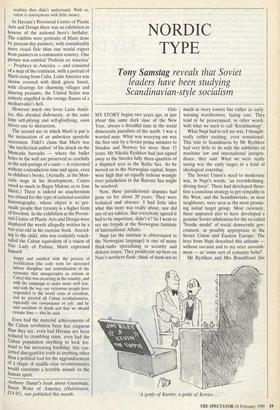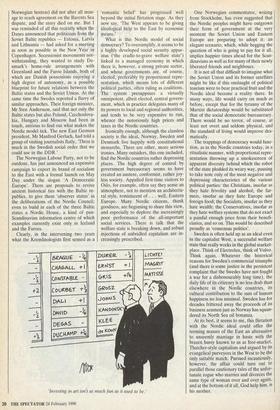NORDIC TYPE
Tony Samstag reveals that Soviet
leaders have been studying Scandinavian-style socialism
Oslo MY STORY begins two years ago, at just about this same dark time of the New Year, always a dreadful time in the social democratic paradises of the north. I was a worried man. What was worrying me was the first visit by a Soviet prime minister to Sweden and Norway for more than 15 years. Mr Nikolai Ryzhkov had just signed away to the Swedes fully three-quarters of a disputed area in the Baltic Sea. As he moved on to the Norwegian capital, hopes were high that an equally tedious wrangle over jurisdiction in the Barents Sea might be resolved.
Now, these jurisdictional disputes had gone on for about 20 years. They were technical and obscure. I had little idea what this story was really about, nor did any of my editors. But everybody agreed it had to be important, didn't it? So I went to see my friends at the Norwegian Institute of International Affairs.
Nupi (as the institute is abbreviated in the Norwegian language) is one of many think-tanks specialising in security and defence issues. They proliferate up here on Nato's northern flank; think of them not so much as ivory towers but rather as early- warning watchtowers, facing east. They tend to be preoccupied, in other words, with what we used to call 'Kremlin°logy'.
What Nupi had to tell me was, I thought, really rather exciting, even sensational. This visit to Scandinavia by Mr Ryzhkov had very little to do with the subtleties of maritime law and international jurispru- dence, they said. What we were really seeing was the early stages in a kind of ideological courtship.
The Soviet Union's need to modernise was, in Nupi's words, 'an overwhelming, driving force'. There had developed there- fore a conscious strategy to get sympathy in the West, and the Scandinavians, as near neighbours, were seen as the most promis- ing initial target group. Most curiously, there appeared also to have developed a genuine Soviet admiration for the so-called 'Nordic model' of social democratic gov- ernment, as possibly appropriate to the Soviet Union and Eastern Europe. The boys from Nupi described this attitude — without sarcasm and to my utter astonish- ment — as 'some sort of romantic belief'.
Mr Ryzhkov and Mrs Brundtland (his 'A gottle of Kerrier, a gottle of Kerrier....' Norwegian hostess) did not after all man- age to reach agreement on the Barents Sea dispute, and the story died on me. But I was reminded of all this recently when the Danes announced that politicians from the Soviet Baltic republics — Estonia, Latvia and Lithuania had asked for a meeting as soon as possible in the New Year in Copenhagen. Secessionist movements not- withstanding, they wanted to study De- nmark's home-rule arrangements with Greenland and the Faroe Islands, both of which are Danish possessions enjoying a high degree of autonomy, as a possible blueprint for future relations between the Baltic states and the Soviet Union. At the same time the Swedes reported a flurry of similar approaches. Their foreign minister, Mr Sten Andersson, said that not only the Baltic states but also Poland, Czechoslova- kia, Hungary and Moscow had been in touch, anxious to find out what makes the Nordic model tick. The new East German president, Mr Manfred Gerlach, had told a group of visiting journalists flatly, 'There is much in the Swedish social order that we could use in the DDR.'
The Norwegian Labour Party, not to be outdone, has just announced an expensive campaign to export its brand of socialism to the East with a formal launch on May Day under the slogan 'A Democratic Europe'. There are proposals to revive ancient historical ties with the Baltic re- publics, to give them 'observer status' in the deliberations of the Nordic Council; even to build in each of the three Baltic states a Nordic House, a kind of pan- Scandinavian information centre of which examples currently exist only in Iceland and the Faroes.
Clearly, in the intervening two years what the Kremlinologists first sensed as a 'romantic belief' has progressed well beyond the initial flirtation stage. As they now say, The West appears to be giving ideological help to the East by economic means.'
What is this Nordic model of social democracy? To oversimplify, it seems to be a highly developed social security appar- atus ('the cradle-to-grave welfare state') linked to a managed economy in which there is, however, a strong private sector, and whose governments are, of course, elected, preferably by proportional repre- sentation, which means lots of different political parties, often ruling as coalitions. The system presupposes a virtually omnipotent, albeit elected, central govern- ment, which in practice delegates many of its powers to local and regional authorities, and tends to be very expensive to run, whence the notoriously high prices and taxes in the Nordic countries.
Ironically enough, although the classless society is the ideal, Norway, Sweden and Denmark live happily with constitutional monarchs. There are other, more serious ironies. Many outsiders, this one included, find the Nordic countries rather depressing places. The high degree of control by government bureaucracy seems to have created an austere, conformist, rather joy- less society. Appalled first-time visitors to Oslo, for example, often say they sense an atmosphere, not to mention an architectu- ral style, reminiscent of . . well, Eastern Europe. Many Nordic citizens, thank goodness, are beginning to share this view, and especially to deplore the increasingly poor performance of the all-important social services. There is talk that the welfare state is breaking down, and robust injections of unbridled capitalism are in- creasingly prescribed.
'Investing in art isn't as much fun as it used to be.' One Norwegian commentator, writing from Stockholm, has even suggested that the Nordic peoples might have outgrown their form of government at the very moment the Soviet Union and Eastern Europe are preparing to adopt it: an elegant scenario, which, while begging the question of who is going to pay for it all, implies happier times ahead for the Scan- dinavians as well as for many of their newly liberated friends and neighbours.
It is not all that difficult to imagine what the Soviet Union and its former satellites might be like if this onslaught of political tourism were to bear practical fruit and the Nordic ideal become a reality there. In many ways, life would carry on much as before, except that for the tyranny of the Marxist dictatorship would be substituted that of the social democratic bureaucracy. There would be no terror, of course, at least not overt and seldom physical, and the standard of living would improve dra- matically.
The trappings of democracy would func- tion, as in the Nordic countries today, in a ritualistic manner, with proportional repre- sentation throwing up a smokescreen of apparent diversity behind which the robot of the state plodded its weary way, pausing to take note only of the most negative and depressing characteristics of the various political parties: the Christians, insofar as they hate frivolity and alcohol; the far- mers, insofar as they hate Europe and foreign food; the Socialists, insofar as they hate wealth; the Conservatives, insofar as they hate welfare systems that do not exact a painful enough price from their benefi- ciaries, and so on. This would be described
proudly as 'consensus politics'. , Sweden is often held up as an ideal even in the capitalist West, a successful welfare state that really works in the global market- place. Think of Electrolux, think of Volvo. Think again. Whatever the historical reasons for Sweden's commercial triumphs (and there is some justice in the persistent complaint that the Swedes have not fought a war for a dishonourably long time), the daily life of its citizenry is no less drab than elsewhere in the Nordic countries, its cultural contribution to the sum of human happiness no less minimal. Sweden has for decades frittered away the proceeds of its business acumen just as Norway has squan- dered its North Sea oil bonanza.
At its best, it seems to me, this flirtation with the Nordic ideal could offer the teeming masses of the East an alternative to unseemly marriage in haste with the brazen hussy known to us as free-market, Thatcher-style capitalism and argued by its evangelical purveyors in the West to be the only suitable match. Pursued incautiously, however, the affair could turn out to parallel those cautionary tales of the unfor- tunate rogue who marries and divorces the same type of woman over and over again, and at the bottom of it all, God help him, is his mother.



















































 Previous page
Previous page